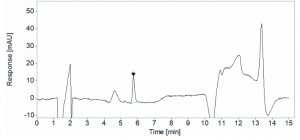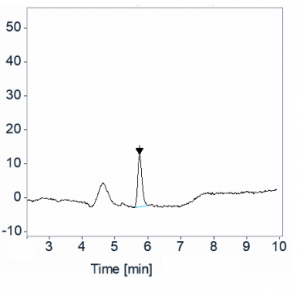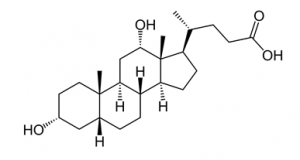A Reliable Method for a Bile Acid
This Deoxycholic Acid Assay produces Run to Run consistency and Precision with Retention Time RSD values of 0.1%. A sensitive HPLC-UV Method that may be used for quantification in raw material and liquid pharmaceutical formulation is presented.

Figure 1.
Full Chromatogram
 Figure 2.
Figure 2.
Magnified Chromatogram to show peak of interest
Peak:

Deoxycholic Acid
Method Conditions:
Column: Cogent Bidentate C18™, 4um, 100Å
Catalog No.: 40018-15P
Dimensions: 4.6mm x 150mm
Mobile Phase:
—A: DI Water
—B: 20:80 Acetonitrile / Buffer (50mM KH2PO4 pH adjusted to 7.5)
—C: Acetonitrile
| Time (minutes) | A | B | C |
| 0 | 55% | 20% | 25% |
| 2 | 55% | 20% | 25% |
| 2.05 | 48% | 20% | 32% |
| 8 | 48% | 20% | 32% |
| 8.05 | 20% | 20% | 60% |
| 11 | 20% | 20% | 60% |
| 11.05 | 55% | 20% | 25% |
| 15 | 55% | 20% | 25% |
Injection vol.: 100μL
Flow rate: 1.0mL / minute
Detection: UV @ 205nm
Column Temperature: 35°C
Sample Preparation: Deoxycholic Acid 50μg / mL in DI Water
Note: Deoxycholic Acid also known as Cholanoic Acid and sometimes sold as Kybella™ or Belkyra™, is one of the secondary bile acids, which are metabolic byproducts of intestinal bacteria and can be used to determine intestinal fat adsorption. Another research application is when a micelle is formed with it, it can used as a mild detergent for the isolation of membrane proteins.
This Method was developed by and is presented courtesy of ARL- Eutech Scientific Services.


